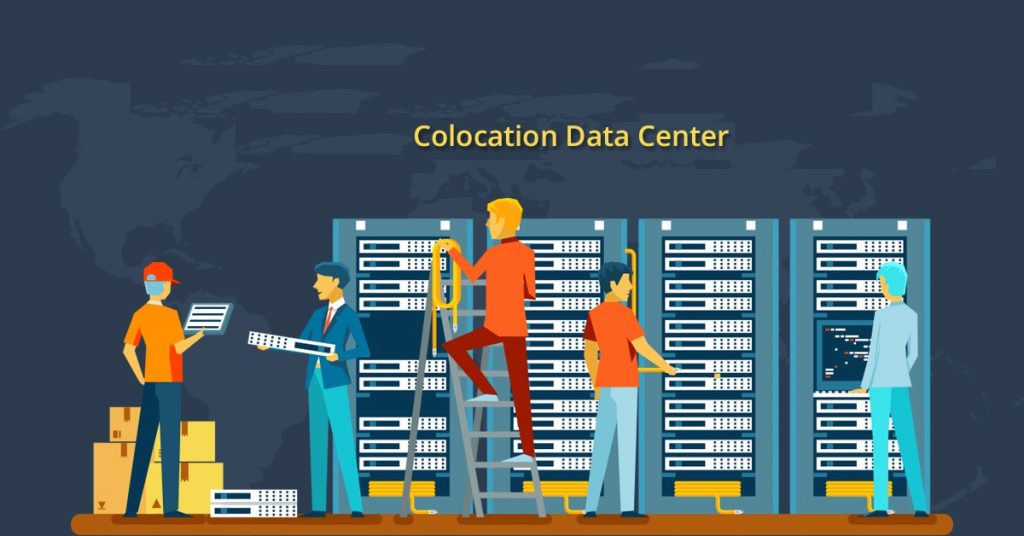Do you have servers that you don’t want to host in your own premises? If yes, a colocation service may be the right choice for your business. Colocation is the practice where you rent space in a data center owned by a third-party to place your servers. In a colocation service in India, you provide the hardware and software for your servers while your colocation provider offers the infrastructure i.e. space, power, cooling and backup for seamless running of these servers.

While choosing a data center may appear to be a simple task at first, it isn’t. Even a minor difference between your service providers can have a significant impact on your performance. From the physical location of your data center to network integration, several critical factors need to be considered when placing your infrastructure in a colocation center.
Let’s look at five important factors that you must pay attention to when choosing a colocation provider for your business.
1) Location
It is good to choose a data center that’s close to your company’s premises. This way your staff can have easy access to your servers. So, whenever a server needs to be replaced or upgraded, you can easily send technicians to the colocation site and get the issue resolved without incurring much downtime.
Proximity to your data center also impacts the overall performance of your IT infrastructure. A colocation site that’s physically close reduces data replication and network latency issues. This speeds up the performance of your website/application.
Latency issues are especially critical in case of chatty applications that need server acknowledgement before they can transmit again. In such applications, any network latency issue can severely affect performance. A data center that’s close can help minimize the impact latency can have on such applications.
Read: Measuring the Cost of Data Center Equipments
If you are looking to cater to users in different locations, choose a colocation provider that has at least one data center near you (primary site) and multiple centers that are located as far as possible from the primary site. Only a provider with reliable network connectivity can ensure all your customers and business partners are able to access your application from any location they want.
2) Connectivity and Service Options
Your colocation provider needs to offer reliable and redundant network connectivity to make sure your performance doesn’t suffer. They should have an entire range of connectivity options to choose from. They should also have carrier diversity-this way you can choose the internet service provider (ISP) of your choice. Advanced networking capabilities need to be in place to help you meet performance and uptime requirements.
It’s vital to remember that colocation service in India is a part of your IT infrastructure; it cannot work in isolation. Your business may require other hosting solutions such as dedicated, VPS and cloud. A partner that offers access to all these services under one roof can help you create and maintain a flexible and powerful infrastructure.
3) Security and Compliance
Security should be your utmost priority when considering a data center. You service provider should deploy physical security measures such as biometric scanners, high-resolution cameras, fire alarms in addition to armed manpower at all strategic points. Some providers allow you to install your own cameras in the data center to let you remotely monitor the colocation environment. Find if your colocation provider offers this facility.
In addition to physical security, the colocation provider should offer services such as DDoS protection, network security and advanced threat detection. Applications that can detect and eliminate security vulnerabilities can safeguard you from intrusion.
Your service provider should comply with the regulatory requirements for your industry and understand the dynamics of a continually changing regulatory environment. The data center should be complaint with SSAE service controls. If you belong to an industry that requires you to meet specific compliance credentials (e.g. HIPAA for healthcare and FISMA for financial services), your host should help you achieve them.
If your colocation center is located in a geographical area that has high-risk factors (e.g. earthquake or cyclone), make sure your service provider addresses them.
4) Support Services
A robust support system is crucial to the uninterrupted functioning of your infrastructure. On-site support available 24*7 through multiple channels offers a quick response in case of a glitch and prevents minor incidents from escalating into larger issues. The availability of such services ensures high uptime and runs your applications efficiently.
Many businesses tend to migrate their applications as they grow over time. Service providers with modular growth plans offer the flexibility to grow your environment as you migrate. Make sure your colocation provider offers this.
In addition, your provider should understand the intricacies of your business processes, application stack and security needs. They should operate in a way that’s consistent with your internal processes and the processes you use for change management.
5) Power and Cooling
Power is a vital factor to consider, so choose a service provider that offers high uptime for power and redundant power systems. This way you will have uninterrupted power both during routine maintenance and when a power source goes offline. Your provider should not only have the adequate power supply to meet your needs today but also surplus to fulfill your future needs. This will be of immense help when migrating to new servers.
In addition to power, your host should have provision for efficient cooling systems. They should invest in new technologies that secure your hardware from overheating. There should be proper air containment designs and cooling walls to facilitate efficient cooling and prevent the occurrence of hot-spots. This can minimize hardware failure and improve the shelf-life of your IT equipment. Your host should also meet the required standard ranges for temperature and humidity. They should be able to integrate cooling techniques into the design and operation of your environment.
Seeking colocation service in India? Get in touch with our hosting professionals at 0120-627-7777 and get a free quote today.
